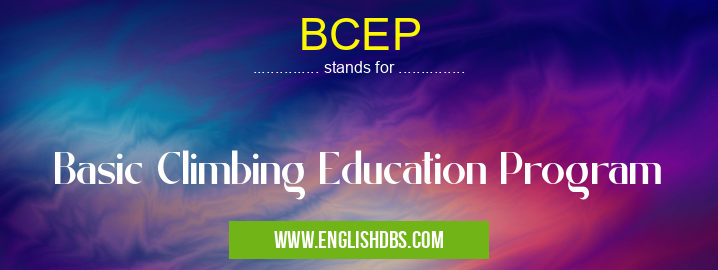What does BCEP mean in EDUCATIONAL
The Basic Climbing Education Program (BCEP) is a comprehensive program geared toward introducing newcomers to the sport of climbing. BCEP provides an education in climbing basics and safety protocols, designed to give climbers the skills and knowledge they need to take on more challenging routes. By educating climbers on proper techniques and developing stronger physical abilities, BCEP can help participants prepare for higher-level routes, competitions, and more.

BCEP meaning in Educational in Community
BCEP mostly used in an acronym Educational in Category Community that means Basic Climbing Education Program
Shorthand: BCEP,
Full Form: Basic Climbing Education Program
For more information of "Basic Climbing Education Program", see the section below.
» Community » Educational
Overview
BCEP covers a wide range of topics related to climbing. Topics may include basic rope work, knot tying, belaying techniques, equipment selection and use, route strategies, mental training for climbers, risk assessment and management, and others. Through lectures and hands-on experience students develop the necessary skills to safely climb independently outdoors or in gyms. The program includes lead climbing instruction so that graduates can become lead certified climbers with proper supervision.
Benefits
Not only does BCEP teach essential skills for safe climbing; it also allows participants to practice those skills in a controlled environment under expert guidance. The course helps develop stronger physical abilities necessary for climbing all sorts of terrain. Furthermore, by learning about proper preparation, gear selection/use/maintenance/storage,and first aid procedures before real-world application, climbers can confidently tackle challenging climbs without too much fear or worry about safety concerns or injury risks. Additionally, people who complete the program have the opportunity to join clubs or organizations focused on coaching or guiding climber’s furthering their education in outdoor adventure sports such as mountain biking or mountaineering
Essential Questions and Answers on Basic Climbing Education Program in "COMMUNITY»EDUCATIONAL"
What is the Basic Climbing Education Program?
The Basic Climbing Education Program (BCEP) is an introductory course to rock climbing designed by professional instructors. The program provides participants with a safe and structured learning experience to help them gain basic knowledge, techniques, and safety measures in the sport of climbing.
What are the benefits of taking a BCEP course?
BCEP courses provide participants with a comprehensive overview of the fundamentals in rock climbing that will enable them to safely and effectively pursue their passion for this sport. The instructors also make sure that the participants have an enjoyable and positive time in their classes so they can continue to stay motivated on their journey.
Who is eligible for a BCEP course?
BCSP courses are open to anyone over the age of 18 who is interested in learning about rock climbing or has already begun exploring it as a hobby or activity. A basic level of physical fitness is recommended, but not required for participation.
How long does a BCEP course typically last?
Depending on the instructional format chosen by each participant, BCEP courses generally last up to 10 days total. This includes 1 day of instruction followed by 8 days of practice and review, and 1 final day to evaluate students’ progress and discuss important topics related to safety when using gear and equipment.
What should I bring to my BCEP course?
Participants should dress appropriately for outdoor activities, including comfortable clothes such as shorts, t-shirts, closed-toed shoes (preferably running shoes), sunglasses, sunscreen lotion/spray, hats etc. Sports drinks are also recommended as these can help reduce fatigue during long climbs or hikes associated with your training session(s). Additionally, be sure to bring any forms you were instructed to fill out prior to your arrival at the BCSP center/facility.
Are there any prerequisites for signing up for a BCEP class?
Generally speaking, no prerequisites are necessary other than having a valid government identification card/license (noting your age) prior to registration. However some instructors may have additional requirements based on their own curriculums so be sure inquire before signing up if this applies in your case.
What type of information will I learn during my BCEP class?
Through various instructional formats students will gain knowledge on proper belaying techniques while anchoring oneself securely onto cliffs and walls; proper use of equipment such as ropes; route finding processes; how best protect oneself from potential hazards; applying rappelling techniques correctly; knots tying methods; types of technology used during ascents; etc. Therefore emphasizing demonstrations that emphasize safety precautions in all aspects of climbing.
Final Words:
The Basic Climbing Education Program (BCEP) is an important resource for those interested in getting into climbing safely and effectively With its comprehensive coverage of safety protocols and key technique fundamentals,BCEP offers a strong foundation of knowledge from which any climber can benefit greatly. Whether you are looking to challenge yourself with more difficult climbs,or just want to learn the basics before taking on your outdoor adventures,BCEP provides an invaluable platform from which you can reach new heights.
